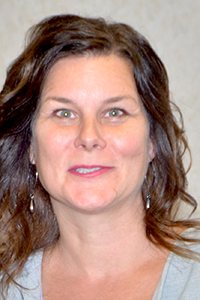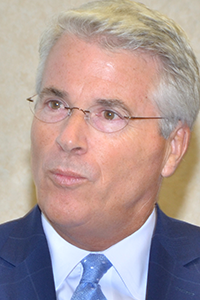Breaking down the numbers
CPAs offer their take on this year’s survey results
Breaking down the numbers
CPAs offer their take on this year’s survey results
In September, Virginia Business and the Virginia Society of Certified Public Accountants held a roundtable discussion at VSCPA’s Richmond headquarters to flesh out the issues highlighted in the 2016 Economic Expectations Survey.
The CPA panelists were Jennifer Duff, CFO at Management Stack in Salem; L. Michael Gracik Jr., managing partner at Keiter in Glen Allen; Jimmy Haggard, partner at Dixon Hughes Goodman in Newport News; and John Renner, principal and owner at Renner & Co. CPA in Alexandria. Below is an edited transcript of the conversation.
Virginia Business: In comparison to last year’s survey, only a few more CPAs this year say the economy has reached full recovery. What gaps in the economy are they are seeing?
 Duff: I believe that employment growth is a major factor in the economy, in how people view it, and that’s an issue near and dear to my heart being from Southwest Virginia. We’ve recently experienced numerous job losses in the area from some of the bigger companies like Norfolk Southern. Home Shopping Network has announced that they’re leaving the area, and Advance Auto Parts also [shifted some jobs to North Carolina], so it’s certainly an issue that we’ve seen in Southwest Virginia. And while the employment growth numbers are trending positive across the state, it is regional because in Southwest Virginia … we have negative growth at the moment. While across the state there are positive averages, they are trending much lower than the national average. So this certainly is an issue that we need to address in Virginia in terms of job growth.
Duff: I believe that employment growth is a major factor in the economy, in how people view it, and that’s an issue near and dear to my heart being from Southwest Virginia. We’ve recently experienced numerous job losses in the area from some of the bigger companies like Norfolk Southern. Home Shopping Network has announced that they’re leaving the area, and Advance Auto Parts also [shifted some jobs to North Carolina], so it’s certainly an issue that we’ve seen in Southwest Virginia. And while the employment growth numbers are trending positive across the state, it is regional because in Southwest Virginia … we have negative growth at the moment. While across the state there are positive averages, they are trending much lower than the national average. So this certainly is an issue that we need to address in Virginia in terms of job growth.
VB: Two-thirds of respondents are opposed to the expansion of Medicaid. The business community has been divided on this issue. Why do you think so many CPAs are opposed to the expansion?
Haggard: I think the primary drawback to the expansion … is the coverage of costs … I think the concern is initially, while there have been some promises at the federal level that those costs would be covered possibly the first couple of years, incrementally states are going to be required to pick up a larger percentage … and I think with states’ budgets being as constrained as they are now, it’s going to be very, very difficult for states to cover those costs …
The other side of that argument is “Who are those individuals that are typically covered by Medicaid?” It’s the elderly. It’s those with physical handicaps. It’s children. It’s lower income families. So, I think the concern is somewhat tied to the Affordable Care Act, that if you expand Medicaid now that the people are involved with the Affordable Care Act and have their own insurance policies, will they then transition to Medicaid?
VB: Infrastructure continues to be the most pressing issue for Virginia, according to the survey. What are the biggest challenges Virginia is facing in terms of infrastructure?
Duff: I think one thing we need to look at is multi-modal transportation. It’s certainly regional. Definitely in the Northern Virginia areas and the eastern areas of the state, the percentages are much higher, people using modes of transportation other than just driving to work. We need to continue to expand that throughout the state. I do know that there was a Virginia Road to the Future package that was passed [in 2013] that’s putting $3 billion back into the transportation infrastructure, which should help the issue. But that’s something that we certainly need to address to draw businesses to Virginia.
VB: The survey shows that the vast majority supported the expansion of the Atlantic Coast Pipeline through Virginia. Do you agree with that position?
Gracik: At the risk of disappointing some of my clients and friends who are dead set against it, I do agree with that position. I think it’s good for the economy of the state. I think it helps ensure our future supplies of clean energy for the state, which is important for economic growth…I think that Dominion Resources has been a very good corporate citizen for the commonwealth, and I think they will do right by any property owners that may be impacted by the pipeline’s route.”
VB: According to the survey, a pro-business climate and an educated workforce are the top two factors in retaining and attracting businesses to Virginia. How is Virginia faring in those areas in your opinion?

… We drill into all of our children, and I’m as guilty because I did the same thing, … “You need to go to college. You need to get an education.” [But] those technical trades and certifications are so valuable to many of the industries that we’re trying to attract. We don’t have that workforce in place today to meet what we would hope our needs would be. So it’s a continual process.
VB: Many respondents say they’re taking steps to improve their work/life balance in their firms. What sort of programs are [you] installing in your firm?
Renner: Well, we’ve been very, very proactive in this area. I noticed in growing up in the profession there’s always been the glass ceiling there. Firms were just discarding young women because they said, “Well, gee. They’re going to get married and … raise a family.” I found that my better staff people while I was a manager at a firm were women. … So when I created my own firm, I created a flexible schedule for them … I think the profession is over 50 percent women now and … young fathers, the new fathers … want that flexibility, too. … The family is a joint effort now, so we’ve been making the effort to make that happen from both [ends]. I think it’s been very successful and hopefully more people will do that.
VB: Access to credit continues to be a problem. What challenges do businesses face when taking out a loan?
Duff: I think that the access to credit is a result of coming out of the recession obviously. Banks are more conservative, and other lending institutions are more conservative in terms of giving money to businesses. One thing that I’ve personally seen is tightening of ratios. Debt service coverage ratios may be tightening in order to ensure that the banks are comfortable with it. Another big shift that I’ve seen in terms of pro-forma statements, and it’s an interesting sort of Catch-22 … You need the capital in order to get the results, but the bank wants the results before they give you the capital. That’s the difficulty that I’ve seen.

Haggard: It’s the length of time, too, because if you try to go get a loan today, it will take you six months or more. And the banks say, “I’ve got plenty of money. I want to lend you the money,” but they don’t. They don’t think anybody has the cash flow to be able to do it. The economy is struggling, and small businesses are struggling, especially in our area. And they really look at the cash flow. Do you have the ability to pay it even though you’ve already got a loan with them, and you’re paying it back? They don’t really pay much attention to that. The regulations are so tight that it’s almost impossible to get a loan sometimes.
VB: Virginia has been continuously dropping in CNBC’s Top States for Business since it ranked as the top state in 2011. What in your opinion is the reason for this continued drop?
Gracik: I think there are a number of factors. I think it may have something to do with our tax rates, mainly more on the local tax side than the state income tax side. Our state tax rate is, in my opinion, reasonable, but a lot of the local taxes — the BPOL [Business, Professional, and Occupational License] tax and personal property taxes — can be a hindrance to attracting companies to our state for business. I think our infrastructure issues that are part of the budgetary issues we had in the state government over the past few years are also weighing unfavorably on that ranking.
VB: The survey shows that respondents feel that Virginia has an adequate talent supply to replenish its workforce. What are some of our strengths in this area and in what ways could we improve our talent pipeline?

In Northern Virginia, everybody’s fighting for CPAs. I’m sure everybody else in the state is doing the same thing. … We don’t have enough accountants … to take care of my firm’s needs. You know, with the millennials, they keep moving around. They’ll move around every year or so it seems like. … But it’s a workforce that we’ve got to do something with. The millennials have got to settle down and take hold of what they’re doing.
We need to really work with our community colleges for the people that aren’t going to go to a four-year college for a degree. Maybe cut down the costs. Right now, they’re trying to get college credits in high school. And we’ve been successful in Prince William County and some in Fairfax County of getting some of those classes where they can get a jump on their college education to cut down some of that costs so that can help out with our workforce in the pipeline.
So I think we really need to work on our young people first. Of course, we have a lot of immigrants, too, that also have got a lot of talent in Northern Virginia, and we’ve somehow got to get them into our workforce and train them in the skills and the culture of the United States. … There’re too many moving parts … but I don’t think we have as big a workforce as everybody thinks we do.
VB: Most respondents rated Virginia’s business climate as good when compared to other states. What is Virginia doing well to attract and retain businesses and how could we improve our business climate?
Duff: Virginia has a lot of initiatives going on in terms of business development. You can go to the Virginia.gov website. There’s a Virginia Performs. There’s a scorecard that lists all these initiatives that are going on. It was very impressive to look at, but there’re also many other things that Virginia can do in terms of community development. Really, what we need to do is [look] at how do we balance pro-business regulation with the tax climate. These are all issues that all states face, but we also need to continue to promote our education in Virginia. And then overall, just improve the quality of life. … The common theme is to keep the people here, to keep talent in Virginia.
VB: An equal number of respondents in this survey said that they were either somewhat pessimistic or somewhat optimistic about the national economy. Why do you think opinion is so divided there?
Gracik: I think for a few reasons. One, we have talked about the partisanship within the national government and how it always seems to be gridlocked there and the national government not working together to take a lot of steps that are needed to provide for stable economic growth.
Also, the stock market is kind of a circus these days with wild wide swings up and down, and those things have an impact on how people view the economy.
Additionally, we are part of a global economy … Whether you actually deal with global commerce or not, things that happen in Greece or what’s happening in China now … can have a negative impact on how folks view the economy.
VB: Survey respondents are in favor of reforming rather than repealing the ACA. Is that a sign they expect the law to be permanent after recent court challenges?
Haggard: If you have the answer to that question, we’d all be a lot better off … I think most people believe that it would be better to go through some modification rather than a repeal. You know, it’s tough to argue against some of the premises that led to the creation of the ACA. But again, there needs to be some modifications so that we know exactly what we’re doing. We’re covering people that need to be covered, but we’re improving our overall health-care coverage, and we’re being able to monitor the costs, and so I think it’s an easier sell with the understanding that, “Yes, it’s here.” It’s not going to be abandoned, but to some extent it does need some modification so that we can all live with it.
t

















